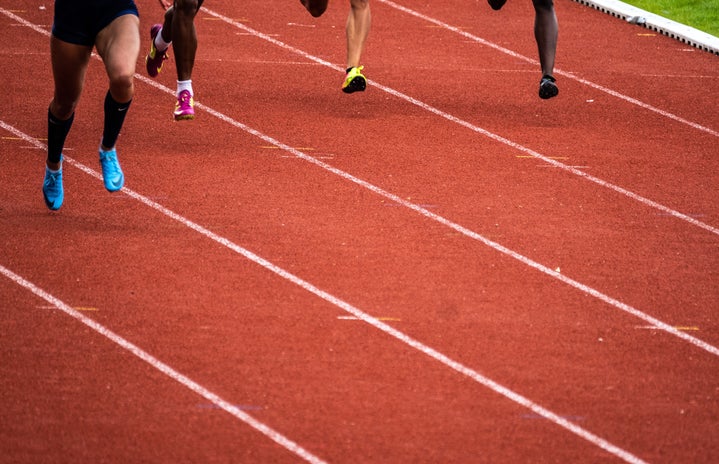Recreational marijuana is legal in 23 US States and eight countries. However, in regions where marijuana laws are yet to be passed, there remains an outdated stigma surrounding the legalization, sale, and use of cannabis products. For athletes like Sha’Carri Richardson and Tara Davis-Woodhall, both of whom had positive THC tests, the ban of marijuana in the NCAA and the Olympics has caused an uproar. Those in favor of the ban argue athletes who use marijuana products are promoting a drug-friendly lifestyle, while the pro-cannabis community seeks the prioritization of testing for performance-enhancing drugs instead of cracking down on marijuana use.
Sha’Carri Richardson is a 23 year-old track and field sprinter who since her record 10.72 second 100m sprint in 2019 has been ruled as one of the fastest American women in history. In 2020, she qualified for the Olympics and was set to attend the 2021 games in Tokyo as a part of Team USA, but after one of her urine samples tested positive for THC metabolites, was promptly suspended from the games.
Richardon feels remorseful but wants outsiders to understand why she put her running career in jeopardy. In an interview with TODAY, Richardson confesses she smoked marijuana to cope with the death of her mother. She defends her decision by explaining how hard it is “to have to go in front of the world and put on a face and hide my [her] pain.” Before assuming the delinquent intentions of an athlete, leadership in the sports community should use mental health crises, like Richardson’s, to support athletes and come to fair conclusions for both parties.
Similarly, American long-jumper Tara Davis-Woodhall was also suspended from competition after submitting a urine sample positive for THC. Davis-Woodhall was stripped of her 2023 national title, where she jumped an impressive 6.99 meters, and was encouraged to complete a substance abuse treatment program. According to the World Anti-Doping Agency (WADA) rules, a positive sample of “THC allows for a reduced three-month suspension if the athlete establishes the substance was taken out of competition and unrelated to sport performance.” In the case of Davis-Woodhall, her suspension was reduced to one month due to her willingness to partake in the substance abuse program, as well as the evidence that she ingested marijuana after competing for her title and thus didn’t use any form of performance enhancing drugs.
Pro-marijuana or not, the unpredictable enforcement of cannabinoid bans in the athletic community is an issue yet to be solved. Davis-Woodhall’s one month suspension and loss of her title seems like a strict enough punishment for a positive THC test, but Richardson’s treatment before the 2021 Olympic games doesn’t correspond with the pre-existing marijuana regulations in the Olympic community. Not to mention, 15 year-old Russian figure skater Kamila Valieva tested positive for trimetazidine – a medication originally intended for heart conditions but used by some athletes to increase endurance – and was allowed to compete at the Beijing Winter Olympics in 2022.
How can an athlete fairly compete in the Olympic games while involved in a globally recognized doping scandal while another is refused the chance to run because she tested positive for a drug both legal and accessible across her country?
Although the Olympics follow the WADA rules on marijuana usage for athletes, they also have some specific requirements of their own. One of the main cannabinoid rules established by the Olympic committee is that athletes are not permitted to use THC products for in-competition use because a 2011 sports medicine study found “athletes who smoke cannabis (…) in-competition potentially endanger themselves and others because of increased risk taking, slower reaction times and poor executive function or decision making.” With more recent studies on the effects of THC on athletes, however, the above explanation is inaccurate.
Although some argue athletes should be banned from ingesting cannabis products due to potential performance enhancement, there seems to be no correlation between regular marijuana use and physical capabilities. In a study from the National Library of Medicine, titled “Cannabis and Athletic Performance”, researchers found no relationship between the use of THC products and exercise performance, claiming, “of the existing data comparing cannabis users to non-users, there are no reported differences in aerobic fitness (VO2max), blood pressure, muscular strength and endurance measures, work capacity, and perceived exertion. In physically active cannabis users, there are no differences in anaerobic power, or markers of stress and inflammation”.
Sha’Carri Richardson and Tara Davis-Woodhall are not the only Americans in their 20s who consume marijuana products, nor are they likely the only competitive athletes who have suffered the consequences of the WADA, NCAA, and Olympic cannabinoid regulations. With almost half of US States legalizing recreational marijuana, and many others providing access to medical usage with prescriptions, the suspension of Richardson and Davis-Woodhall do not follow suit with most of the country’s standards on marijuana usage. While Kamila Valieva competed with a positive trimetazidine test, American athletes are being accused of doping when using THC products, even though there is no correlation between marijuana usage and athletic performance. Hitting a blunt, taking a bong rip, or taking a 10mg edible before bed is not going to cause Olympians to lose all athletic talent, nor will it cause them to have an upper hand at competition.


